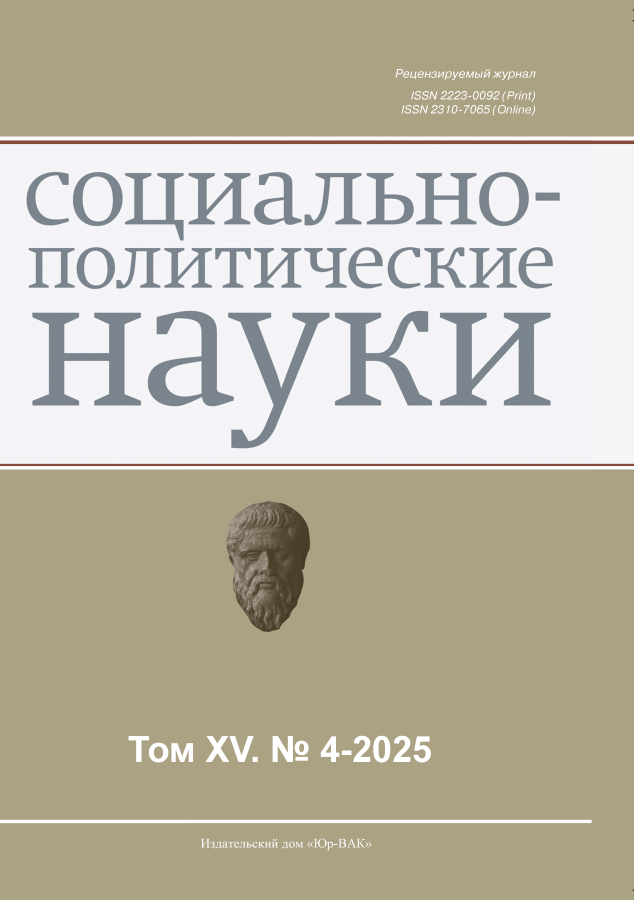National-state identity in the digital age: between patriotic consensus and informational anxiety
- 作者: Grebnyak O.V.1
-
隶属关系:
- Institute of Socio-Political Research of the Federal Center of Theoretical and Applied Sociology of the Russian Academy of Sciences (ISPR FCTAS RAS)
- 期: 卷 15, 编号 4 (2025)
- 页面: 34-45
- 栏目: II Drobizhev Readings – 2025
- URL: https://journal-vniispk.ru/2223-0092/article/view/348432
- DOI: https://doi.org/10.33693/2223-0092-2025-15-4-34-45
- EDN: https://elibrary.ru/VWUAXC
- ID: 348432
如何引用文章
详细
Digital transformation challenges the traditional mechanisms of forming national-state identity. If its reproduction was previously concentrated in the hands of the state and institutions (education, culture, traditional media, etc.), today the key agents of influence are digital platforms, algorithms, and online communities. This creates fundamental challenges: fragmentation of the information space, growing distrust in information sources, transformation of civic engagement, and internal tension. The article analyzes the theoretical foundations of these changes: the decentralization of power in the network society, the formation of information bubbles and echo chambers, the dual role of platforms as spaces for both public consolidation and polarization, as well as the phenomenon of coexisting patriotic consensus and critical attitudes toward the authorities. The empirical basis – data from the nationwide sociological monitoring “How Are You, Russia?” – allows tracing how these processes manifest in real public consciousness. It is shown that trust in television correlates with optimism about the country’s future, while the online environment intensifies ambivalence. Civic engagement is shifting to digital formats, especially among the youth. At the same time, a high level of patriotism coexists with criticism of the authorities, indicating a differentiation of civic consciousness rather than its disintegration. It can be concluded that national-state identity in the digital age does not disappear but becomes a tense balance between trust and anxiety, loyalty and criticism, consolidation and fragmentation. This requires identity policy to abandon the monopoly on narrative and move towards its co-production with society.
作者简介
Oksana Grebnyak
Institute of Socio-Political Research of the Federal Center of Theoretical and Applied Sociology of the Russian Academy of Sciences (ISPR FCTAS RAS)
编辑信件的主要联系方式.
Email: oksananov@yandex.ru
ORCID iD: 0000-0002-4565-7095
SPIN 代码: 6256-1918
researcher
俄罗斯联邦, Moscow参考
- Akhremenko A.S., Stukal D.K., Petrov A.P. Network vs message? Protest diffusion on social media: Theoretical and data analytics perspectives. Polis. Political Studies. 2020. No. 2. Pp. 73–91. (In Rus.). doi: 10.17976/jpps/2020.02.06.
- Bauman Z. The individualized society. Moscow: Logos, 2005. 390 p.
- Bronnikov I.A. Self-organization of citizens in the age of digital communications. Outlines of Global Transformations: Politics, Economics, Law. 2020. Vol. 13. No. 2. Pp. 269–285. (In Rus.). doi: 10.23932/2542-0240-2020-13-2-14.
- Volodenkov S.V. Internet technologies as a contemporary tool of mass political reality virtualization. Moscow University Bulletin. Series 12: Political Science. 2017. No. 2. Pp. 15–23. (In Rus.)
- Vorobeva I.N., Mekhova A.A. Manifestation of national identity in the socio-political values of student youth. Science. Culture. Society. 2024. Vol. 30. No. 3. Pp. 114–129. (In Rus.). doi: 10.19181/nko.2024.30.3.7.
- Grachev M.N., Evstifeev R.V. The concept of the “Truth Decay” in a digital society (an analytical review). Outlines of Global Transformations: Politics, Economics, Law. 2020. Vol. 13. No. 2. Pp. 229–248. (In Rus.). doi: 10.23932/2542-0240-2020-13-2-12.
- Dobrinskaya D.E. What is the digital society? Sociology of Science and Technology. 2021. Vol. 12. No. 2. Pp. 112–129. (In Rus.). doi: 10.24412/2079-0910-2021-2-112-129.
- Drobizeva L. Process of civic integration in poliethnick Russian society. Social Sciences and Contemporary World. 2008. No. 2. Pp. 68–77. (In Rus.)
- Castells M. Communication power. Moscow: HSE Publ., 2016. 563 p.
- Castells M. The information age: Economy, society and culture. М.: HSE Publ., 2000. 606 p.
- Levashov V.K., Velikaya N.M., Shushpanova I.S. et al. How are you, Russia? Express information. 55th stage of the sociological monitoring, May 2025. Moscow: FCTAS RAS, 2025.
- Levashov V.K., Grebnyak O.V. Expansion of artificial intelligence: Expectations and attitudes of citizen. Sociological Studies. 2024. No. 12. Pp. 13–23. (In Rus.). doi: 10.31857/S0132162524120022.
- Pariser E. The filter bubble: What the Internet is hiding from you. Moscow: Alpina Biznes Buks, 2012. 304 p.
- Tishkov V.A. The nation and national identity in Russia. Bulletin of Russian Nation. 2008. No. 1 (1). Pp. 120–128. (In Rus.).
- Alter P. Nationalism. London: Hodder Education Publ., 1994. 160 p.
- Barberá P. Social media, echo chambers, and political polarization. In: Social media and democracy: The state of the field, prospects for reform. N.Y.: Cambridge University Press, 2020. Pp. 34–55. doi: 10.1017/9781108890960.004.
- Bennett W.L., Segerberg A. The logic of connective action: Digital media and the personalization of contentious politics. Cambridge: Cambridge University Press, 2013. doi: 10.1017/CBO9781139198752.
- Chadwick A. The hybrid media system: Politics and power. N.Y.: Oxford University Press, 2017. 368 p. doi: 10.1093/oso/9780190696726.001.0001.
- Earl J., Kimport K. Digitally enabled social change: Activism in the Internet age. Cambridge: MIT Press, 2011. 258 p.
- Gillespie T. Custodians of the Internet: Platforms, content moderation, and the hidden decisions that shape social media. New Haven: Yale University Press, 2018. 297 p. doi: 10.12987/9780300235029.
- Nielsen R., Graves L. “News You Don’t Believe”: Audience perspectives on fake news. Reuters Institute for the Study of Jounalism, 2017.
- Papacharissi Z. Affective publics: Sentiment, technology, and politics. N.Y.: Oxford University Press, 2014. 176 p. doi: 10.1093/acprof:oso/9780199999736.001.0001.
- Sunstein C.R. Republic.com 2.0. Princeton: Princeton University Press, 2007. 251 p. EDN: QWMTJV.
- Tajfel H., Turner J. The social identity theory of intergroup behavior. In: Political Psychology. J. Jost, J. Sidanius (eds.). N.Y.: Psychology Press, 2004. Pр. 276–293.
- Tufekci Z. Twitter and tear gas: The power and fragility of networked protest. New Haven: Yale University Press, 2017. 360 p.
- van Dijck J. The culture of connectivity: A critical history of social media. N.Y.: Oxford University Press, 2013. 228 p. doi: 10.1093/acprof:oso/9780199970773.001.0001.
- Wardle C., Derakhshan H. Information disorder: Toward an interdisciplinary framework for research and policy making: Report. Council of Europe, 2017.
补充文件











